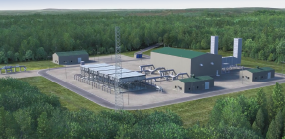The Natural Gas Act authorizes the construction and operation of interstate natural gas pipelines, with regulatory oversight by the Federal Energy Regulatory Commission (FERC). Since these activities are performed under the authority of the Federal government, National Environmental Policy Act (NEPA) reviews are required.
Previous INGAA Foundation reports have forecast that the interstate natural gas pipeline industry will require more than $34 billion in infrastructure development through 2010 to satisfy the nation’s demand for clean and dependable natural gas. This translates into approximately 2,000 miles of interstate natural gas transmission pipelines and associated facilities each year to reach a projected 30 trillion cubic foot natural gas market. Estimates are that up to 30 percent of the costs of these projects are environmentally related, and thus subject to NEPA regulations. Data requests, time delays and conflicting agency decisions contribute to the inefficient expenditure of resources and capital. Minor improvements in the NEPA process can result in significant cost savings to consumers.
This report presents the results of a study for The INGAA Foundation, Inc. by URS on NEPA implementation for interstate natural gas pipeline projects. The objective of the study is to improve the NEPA compliance process by increasing its efficiency and effectiveness. This would result in improved project implementation while providing adequate environmental protection. The specific objectives are to:
- Evaluate the legal and regulatory background of the NEPA compliance process as it relates to the natural gas pipeline industry;
- Evaluate the current NEPA compliance processes and requirements to determine their effectiveness and adequacy; and
- Develop recommendations concerning how to make the current NEPA compliance process more efficient and effective.
A variety of techniques were used to achieve these objectives, including a review of NEPA and other related major regulatory requirements, completion of two internal URS workshops involving technical and regulatory specialists and outside legal counsel, review of relevant major studies within the gas pipeline industry and completion of an extensive computer-based, key word literature search. The literature search provided substantial information, including detailed reviews of NEPA effectiveness and improvement, particularly by the Council on Environmental Quality (CEQ) and various researchers.
The study identified five major issues that exist with respect to the effectiveness of NEPA, including:
- Inadequate integration of NEPA compliance with NHPA and ESA compliance, and other Federal, State and local permitting;
- Inappropriate, overlapping and inconsistent Federal, State and local permitting and mitigation requirements;
- Inadequate interagency communication, coordination and decision-making;
- Delayed and inefficient completion of the NEPA compliance process; and
- Submittal of applications for inadequately planned and designed projects by pipeline companies.
For each issue, we present an overview and description, recommendations and steps to implement each recommendation. The results are summarized in the following table:



